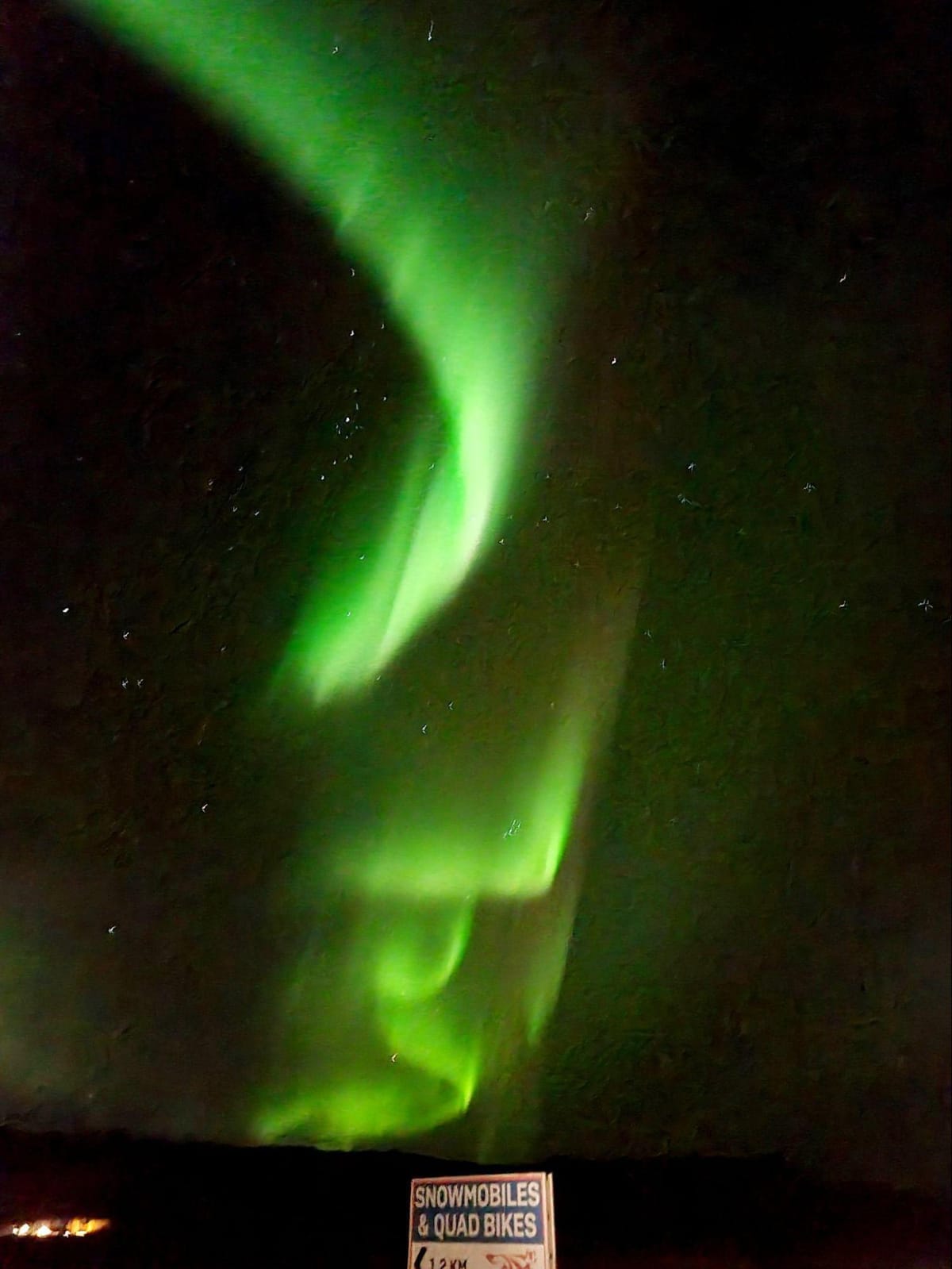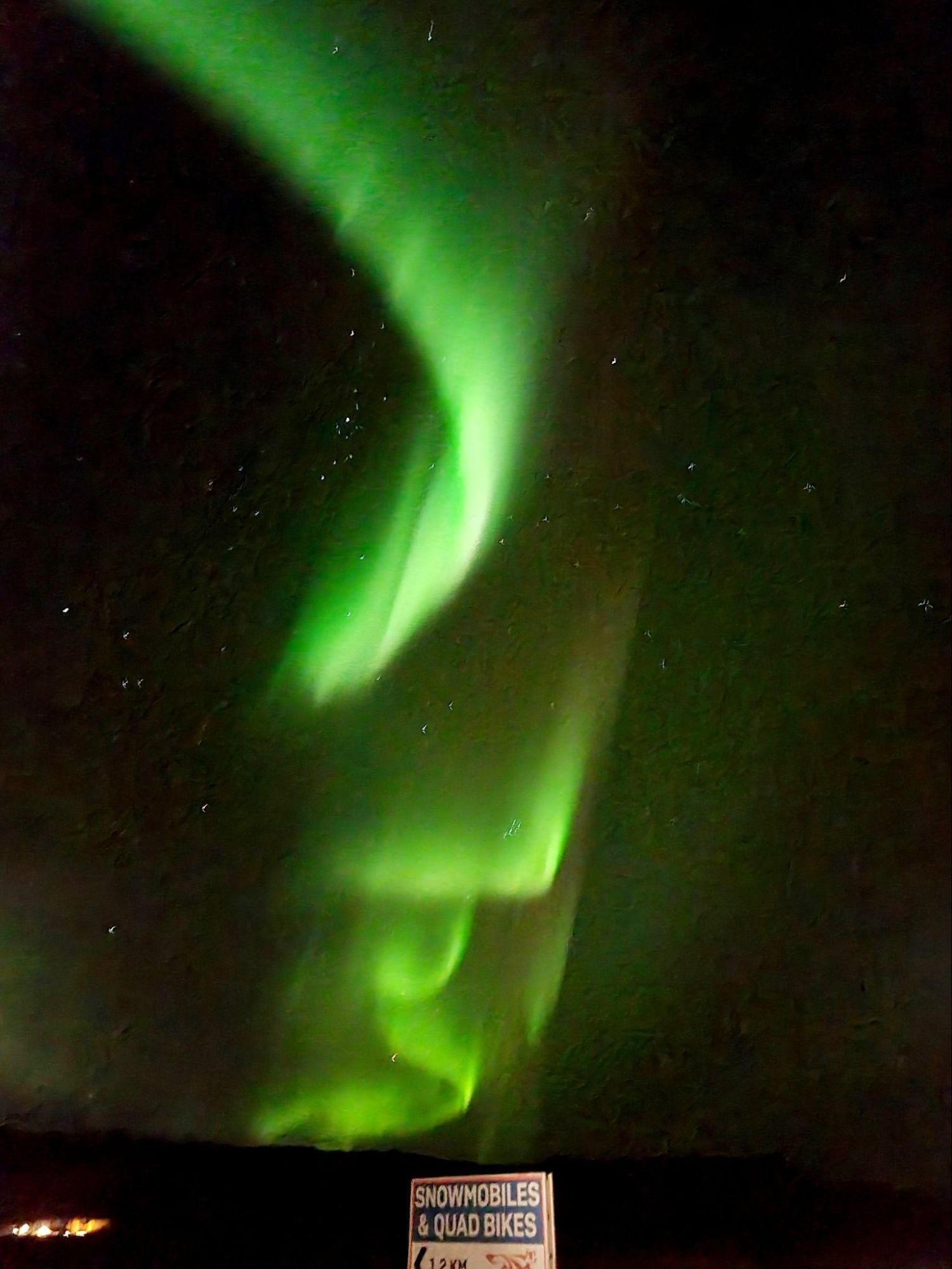Mase Peterson ’23E Presents: “The Ring Road”
Mase Peterson ʼ23E presents a lyric essay inspired by an experience abroad in Iceland. Driving down a remote road, Peterson struggles with isolation on a search for the Northern Lights.


October 2021
I keep driving — despite the fact that I’m craning my neck above the steering wheel and can’t see shit through the 2:00 a.m. void. The Ring Road, or what most native Icelanders refer to as Þjóðvegur 1 (Route 1), is the most steadfast geographic accommodation to outside visitors, churning round the jagged circumference of the entire island and connecting all major towns and tourist ventures with the southwestern capital of Reykjavík. With the headlights turned off and no other late-night travelers in my vicinity, the route feels more endless and devouring than before. Thankfully, I’m too far from my Maine homestead to worry about any oblivious moose. But let’s be real: this hail-beaten tin can disguised as a Suzuki Swift would be the actual victim in any freak collision. Despite my lack of concern, all I can see now are shadowy resemblances of the southern coast: a two-dimensional array of high peaks that fortify an unsteady terrain, filled with magma and moss; the ancient stomping grounds of Giants and Berserkers.
It’s funny. As a kid, I used to have repeated nightmares of this exact scene: me, alone in the dark, helplessly driving on some strange highway with no predetermined end, my little hands clasped tightly onto the wheel as I sink into the dread of where I might arrive. Drifting. Unseen. Suspended in the Unknowing. And I would wake up feeling as though several hours, sometimes years, had passed. I would even check the bathroom mirror to see how much I had aged until I eventually remembered that dreams are their own ontological dimension of space and time; where only one law dictates and that is lawlessness. But now, as a 26-year-old grasshopper who occupies the unstable signifier of “American” while roaming the vestigial landscapes of “western Europe,” I’ve somehow become an intimate companion to the unknown and undeterminable.
My phone buzzes, and I briefly glance at the cracked screen. Take action! Heavy wind storm with even stronger gusts approaches your area. Thanks, Master Google. I take a sip from my bottle of Appelsín — it is, in fact, an orange-flavored soda. But this country seems pretty fond of cheeky misnomers, given its historically deceptive name — and then continue to peer at the black sky ahead. Nothing. An absolute, vast nothingness.
****
It’s about five or so minutes before I realize someone has been following me. Not very strange considering this is the primary route that Icelanders and non-Icelanders use to get around, but I start feeling somewhat unsettled. How have I not seen them yet? Have they not had their headlights on this entire time? Maybe we have similar intentions tonight but dammit I should be the only one allowed to sneak up on people. I quickly revert my focus to the vehicle behind, attempting to discern what or who they could be. Then, out of nowhere, the driver pulls over to the side of the road; a widely condemned practice since there’s no shoulder to pull off onto. Police, maybe? Car troubles? An unaware tourist? Rather than be plagued with questions that fuel my current anxiety, counterintuitively, I decide to expose myself to the potential risks and slow down enough to stop.
When I pull over, I sit and wait to see what happens. The stranger’s bright headlights beam in my rearview, but there’s no sign of anyone leaving the vehicle. They just sit there for a long while, about 50 feet behind where I’m parked, and I increasingly feel as though we’re both playing a mind game of who will get out first to investigate. But then nothing happens. My adrenaline must be more intense than noticeable because I don’t realize that my car’s radio is still playing. Is that Jason Derulo? It’s like I never left home. So I shut the music off. And as if on cue, the headlights diminish, leaving nothing but the cold night between us. Nope nope nope. I start to seriously rethink my choices when the driver’s door opens and a tall figure steps out. Before I even consider how hazardous this could be, I follow suit and exit the Suzuki.
My eyes still readjust to the total-darkness but I already can tell that there are multiple figures clumped together in a group outside what I think is a small minivan. And at this moment, all that loops inside my head is: please don’t be a secret Swedish cult that targets sleep-deprived genderqueers; I haven’t even finished undergrad; what if I die and never get to become a problematic Buddhist vegetarian film director? Rather than waiting to find out, I tentatively step towards them and decide to initiate.
“Hi, is everything okay?” I ask, surprised by the relaxed tone of my voice, waiting for a response before moving any closer.
“Oh hi!” the friendly voice of a young (presumably) woman answers. “Yeah, we’re totally fine! We’re just looking for the lights — they’re apparently really bright tonight?”
An immediate calm trickles from my brain down to my body. I smile, easing my shoulders, and step forward. I don’t move much closer, so as not to cause any discomfort among the women. Even though I’m not a man, most people automatically assume that’s the case, and I’d rather avoid any harmful messaging.
“Yeah but we’ve had zero luck finding them,” says another young (presumably) woman, though this time I make out a distinct West Coast accent. “Are you by yourself tonight?”
“I am! But nothing on my end, either. I was hoping I could see more with the headlights off. Not even flickers,” I say, admitting to my unsafe approach.
“Wait, are you American?!” another woman gleefully inquires.
“Yeah!”
“Are you studying abroad? Where are you from?!” the first woman asks.
“I am! I go to school in Massachusetts.”
The group is surprised and becomes jubilant by this answer.
“Wait, holy shit, us too! Where do you go?!”
“Amherst College! What about you?!” I ask, trying to match their energy.
This is where I remind myself that even as a first-gen, low-income student, it’s okay to be transparent and proud of this answer even if I feel reserved to admit it. Even if saying it is just another reminder that I might never feel comfortable with the inner dissonance between where I come from and what the world expects of me based on my education.
“Harvard,” one of them replies, a hint of self-gratification hinged onto the word’s utterance.
And this is the part where, in a matter of milliseconds, we all silently but mutually acknowledge the absurd realness of our positions; the hyper-selective echelon that we represent, not only as students but as human beings — who have convinced ourselves and each other that because these institutions chose us, we are deserving of all the pain, awkwardness, and triumph enkindled by such acknowledgments. Representations, yes, but also experiments of a greater American project, known to many and inherited by virtually none. And perhaps we are deserving. But I’m too fragmented on the inside to reason with myself about this condition even more than I already do. So, instead, I will delicately, and with a cathectic expression, remove myself from that absurdness, and respond as though I haven’t thought about it every day for the last two years.
“Right on,” I present smiling, not skipping a beat. And I can’t help but wonder if any of them feel the same way. But while I notice them begin to ruminate aloud with each other about what the dark sky could possibly reveal from a different direction, I accept that I’ll never know.
“Is that your car?” another new voice asks among the excited chatter.
“Nah, just a rental,” I say, gesturing towards the red and blue license plate. “If y’all are looking for a good spot to see the lights, I’ve heard the black sand beaches near Vík are ideal. I think that’s where I’m going.”
Most of them remain too distracted to answer but I detect some consideration of the prospect.
“That’s such a good idea! Maybe we’ll see you there!” the second voice chimes. As the women continue brainstorming, their hidden demeanors suddenly illuminate in scattered, blinking patterns via the light of phone screens, and I can view the hodgepodge of personalities. Light furrowed eyebrows, bushy red hair, inquisitive gazes. It hasn’t registered until now, but I notice that none of us are wearing masks. Even when considering the country’s comparative lack of need for vigilant health policy, I still feel astonished — exposed — as though I’ve never seen faces before now. Maybe it’s because they were initially voices, disembodied in the ambient sphere of nothingness. Or maybe I’ve forgotten how vulnerable I feel when being perceived by the unconditioned totality of a stranger’s look. It’s as though I’m a newborn entering the world, crying and kicking beneath the harsh fluorescent light, paralyzed to know exactly where I come from.
It isn’t until one of them looks up from their phone screen and stares directly at me that I understand how much I hate this feeling.
“Maybe! I think I’ll go ahead and head over. But nice meeting all of you! And glad to know you’re safe,” I say, regretting my decision to tell them my destination. The group erupts in a chorus of “thank you!” and “you too!” as I unsteadily rush back to the Suzuki. I can still hear their distant anticipations after I close the driver’s door and turn on the ignition.
I take a deep breath.
One, two, three, four, five, six.
Hold.
Release.
One, two, three, four, five, six.
Steering wheel, seat, cup holder.
Cold air, sore back, runny nose.
Window. Highway. Endlessness.
Grounding myself usually regulates my anxiety but I can’t stop feeling distressed by the interaction. So I turn my high beams on and continue my drive down Route 1. Holding tightly onto the steering wheel, I manage to take another sip from my Appelsín. The silence in the car is so eerie and resounding when staring at the road ahead, so I swiftly turn on the radio. A couple of broadcasters quip with each other in Icelandic before they transition into a Jimi Hendrix single. I don’t really know the song but I welcome any distraction at this point. A couple of minutes pass. Jimi belts: You got me blowing my mind, blowing my mind…is it tomorrow or just the end of time? Then a cacophony of whistles and guitar-shredding swarms the inside of the car, subjecting me to a frenzy of internal narration. But then the song fades out, and the broadcasters return to the surface. This time, they exchange in tones of pressing disconcertment. I can only distinguish a few words: Russia…Ukraine…pandemic…and another that sounds similar to weapons.
Before the two voices can continue in their phantom discourse, I decide that I’d rather exist in the unspoken and turn the radio off.
****
Reynisfjara, during the day, feels like a living memory that you can step inside. Or a dream you realize you’d forgotten. The black sand beach, famous for attracting many outside venturers, is nothing but a violent aftermath; geological echoes from the now-dormant Katla volcano, whose molten lava once crashed against the seawater, left gigantic cliffs and basalt columns as a disfigured sanctuary for all members of the biosphere. At the bottom of these structures, the smooth, dark pebbles are a stark reminder of the past’s destruction. But it’s a soft revisitation that enables your sense of place, of time, and of yourself as a collateral being inside those forces. If you stand still near the coast long enough, letting the cold ocean burn your naked feet, you realize you, too, are a child of nature’s gorgeous brutality.
I first arrived here a few days ago after a night resting in a nearby parking lot outside of a pub called Ströden Bistro. I remember waking up to the most vivid light reflected off of the window’s dew. Though I barely slept and my body ached from the contorted backseat positions, I felt an immediate solitude when I noticed how the golden morning horizon touched the pitch-black grain. A celestial anointment pouring itself onto the shackled earth. And I wanted every person in the whole world to experience this place, somehow, so that they could feel something; anything else besides the uncertainty of their fortunes. But as I sit and stare at the atmosphere above me, searching for the electric particles that have told all kinds of stories to all kinds of people living in the twin hemispheres, all I see now is purgatory.
I check the time on my phone. 4:37 a.m. I’ve been sitting here inside the car, listening to the muted ocean waves, and I don’t have what it takes to leave this scene yet. I look around the beach but there’s not a single person straying. As far as I can tell, I am and have been the only person here for nearly two hours.
My phone buzzes. A notification pops up:
Warning! Strong winds up to 40 mph. Take shelter if possible.
I swipe the notification away and look out into the darkness. The physiognomy of this once familiar landscape feels orphaned and uninviting. What even happened here? Where did the sanctuary go? Why does this place make me feel as though I’ve lost all resemblance to anything, to myself? About two hundred yards down the coast, a lighthouse, with its revolving ghostly orb, calls to nothing and no one. I almost figure it’s a cruel beacon meant to ward me and other visitors off, but then I would need to feel as though I am an alive person at this moment. And I don’t. I feel unalive. And I begin to wonder if I ever was living or if it’s even possible to be a person if you feel this degree of loneliness.
I become frightened by this feeling; so much so that I turn the radio back on for some comfort. But even the staticky voices and disjunctive melodies become transformed by this current underworld. I turn it back off, sitting and waiting and sitting and waiting. Drifting. Unseen.
Suspended.
I look at my phone screen again. 4:45 a.m.I can’t do this anymore.
Without any thought or intention, I follow my counterintuitive urges and enter into the stormy night.
At first, all I feel is the deep and catastrophic pull of the Atlantic windstorm, the blood inside my ears already pulsating by the sheer force of the air and movement. I’m wearing multiple layers in preparation for the subarctic climate, but it isn’t enough to counter the weather’s harsh influence. “Cold and windy” doesn’t even begin to explain these conditions. This is a maelstrom.
When I step out onto the beach, about a hundred steps away, I can see a dark glimpse of the basalt column cave that I visited during my initial trip to Reynisfjara. While I’m not thrilled by the idea of leaving my car behind and retreating inside of a dark volcanic cavity, I know I can’t go back just yet. Not until I feel like this beach, a place I once felt so connected to, returns to its actual state.
My legs take over as I walk eastwards towards the cave, and I realize I’ve forgotten my phone inside the car. Too late to go back. I’m in this now.
Pebble after pebble, I fumble my way towards the giant opening as several gusts of wind almost throw me off my feet, into the merciless tide. When I finally reach its dark mouth, I go inside and then suddenly—
the world ceases
still
breath
rock
walls
wet
drops
hands
touch
breath
less
more
breath
hands
trace
eyes
wet
wet
wet
wet
feet
touch
Still
Earth
and when i think of the world i think of my best friend
an agoraphobe of seven years
still
holding
on
i think of her aching questions, afraid
that she might lose herself to another self
a former self
in the haze of doubt and disease
i ask myself these questions hoping
that time and language in all its strange symmetry
could
u n r a v e l
and
collapse
even
further
convey something Else
some thing
where
Regression
could mean
e v e r y t h i n g
a quiet space
where all selves
could be
Free.
I leave the darkness of the cave and slowly walk back to the car.
While I’m not sure how much time has passed, I know that the sun will start rising soon. So instead of trying to continue sitting and waiting, I decide it’s probably best to move on. Drive back to the city, go find a room somewhere, and sleep until my departure tomorrow. Maybe I could grab a drink first. Go dancing. Since I’m not really that concerned about the upcoming circumstances, whatever I do next won’t be of much consequence to my remaining time here on the island.
When I return to the vehicle, it’s not until I turn the ignition on and adjust the heat that I realize the wind has subsided. The place around me is still unseeable, aside from the peripheral lighthouse, but I can actually hear the ocean more than I was able to before. I put the car in reverse, turn the headlights on, and promptly leave the beach.
****
Soon my thoughts oscillate between stasis and digression, as if my mind were tethered to the deep, rhythmic movements of the North Atlantic, which is now slowly shrinking in my rearview.
I start to wonder if the group of strangers I met made their way back to wherever they came from. I think about the two broadcasters I heard on the radio, and I wonder how often they think about the morphology of their mother tongue; how it has barely changed since its ninth-century inception. How they could read the earliest of texts in their expansive history with relative ease. Using language as a form of cultural and temporal relapse, how they can understand everything about what their ancestors knew and loved.
Push. Pull. Pull. Push.
Then I begin to ponder about Geysir. Earlier in my trip, I visited the southwestern landmark in hopes of seeing a once-in-a-lifetime eruption, but was met with mostly hot steam and the putrid smell of sulfur. However, there were other geysers in close proximity to the landmark. One of them, small but frequently active, was the source of great attention among many present spectators, including myself. When thinking of its many boiling discharges, I remember the deceivingly simplistic movement. How the rise and fall was not just a matter of isolated actions, but a dynamic interplay of physics. A connection, mutually dependent, engineered using the return to something former. To the core recesses of earth.
Up. Down. Down. Up.
I think about how before I knew Derrida, I was deconstructing myself until all that was left was myself.
Up.
Down.
I think about turning 26 during a time when we all hastily demand to move forward but, somehow, always feel left behind.
Down.
Up.
And, finally, I think about my family. How we may always see and know ourselves only as the history we share.
Though I could try to get a solid grip on what’s coursing through my brain, I instead feel compelled to take in everything else around me as I head towards…whatever fucking place I decide comes next. But even in the fading darkness, there are a few images worth noting: on my far left, a long yellow fence guarding a huddled flock of sheep who remain motionless in the inner center of a mossy hill. To my immediate right, an immense meadow where a tiny, red-roofed church made of white-wooden planks plainly rests. And up ahead, I see—
An emerald burst of light rippling through the sky.
I immediately pull over and park on the shoulderless route. Without pause, I completely forego any adherence to law and order as I try to witness what takes place in the expansiveness beyond my understanding.
There it is, shimmering before me in the nascent dawn, as if the gods poked a hole in the fabric of the universe and let the spirits collide with each other after years of separation.
There it is.
I know I should probably take a picture or something but I can’t feel the tips of my fingers. Really, I can’t feel anything. And I’m completely okay with this dissociation.
As I continue to stare at the dancing fragments of the aurora borealis, a single, static realization persists in the forefront of everything I’ve already considered:
Regression is the modality of real change.
It is an urgent, paradoxical undressing of our collective ego, of our desire to know who we are and what happens next.
Rather than being an ugly and unacceptable process, why can’t we instead reimagine our former selves as being fundamental to that process? And why should progress be the only method of discovery?
Regression is the process.
Progress is regression.
We must regress until we perish, over and over.
Find where the past remains.
And then keep regressing.
Because regression is really just survival; a necessary location for recollecting all iterations of us and finally understanding the complex configuration.
We must learn how to go back to the former if we are to meet any latter.
This is how the world keeps moving.
This is where we know ourselves.
And this is where we find each other.
Seeing this, I roll my window down and let the cold morning air kiss my wet cheeks. And as the lights endlessly refract in their shape and color, I drive the car back onto the Ring Road and howl. Into the endlessness. Into space.
And I keep driving—




Comments ()